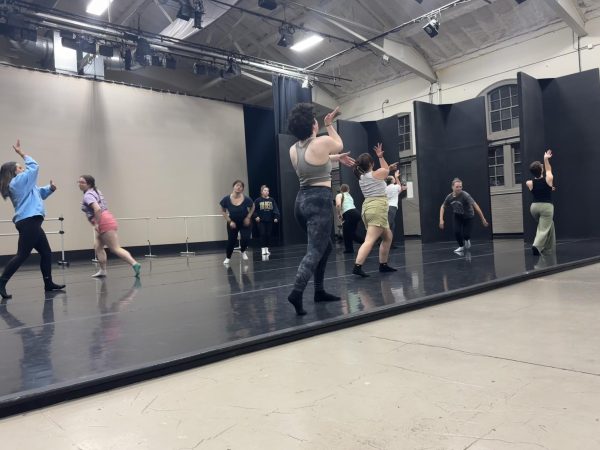Faces old and new: ‘Sex Education’ dives deeper
Netflix’s “Sex Education” season 2 opens with protagonist Otis Milburn’s, played by Asa Butterfield, sexual awakening, an outbreak of chlamydia at Moordale High and single parents navigating the murky waters of dating at the same time as their children — which is to say that, in the space of one episode, the show got off to a very strong start.
“Sex Education” is, first and foremost, a deeply binge-worthy show, and season 2 proves it in each of the episodes that follow. The diverse cast of characters introduced in season 2 is developed even more deeply as we watch Otis and Ola Nyman, played by Patricia Allison, date, then break up over his feelings for Maeve Wiley, played by Emma Mackey, and Ola’s confused sexuality. We see Ola’s father Jakob Nyman, played by Mikael Persbrandt, and Jean Milburn, played by Gillian Anderson, pursue a relationship challenged and inevitably doomed by its simultaneity with their children’s romance.
Characters that had appeared in the periphery of season one come more clearly into focus as well. Ola becomes the center of her own story, rather than a character in Otis’s, as she grapples with her sexuality. Eric Effiong, played by Ncuti Gatwa, is torn between two men he cares for, and firmly asserts his Christian faith and his sense of self along with it.
Swimming jock Jackson Marchetti, played by Kedar Williams-Sterling, attempting to find himself outside his sport through the theater is a little too Troy-Bolton-cliche for my taste, but his awkwardly developing friendship with Viv Odesanya, played by Chinenye Ezeudu, is far less cliched and makes for a more enjoyable watch.
The Groff family has a gripping story of their own, often told in few words. Adam Groff’s, played by Connor Swindells, inability to find his place, despite endearing attempts, cautions against narrow means of evaluating young people’s value. His relationship with his father is painfully stagnant. Maureen Groff’s, played by Samantha Spiro, coming into her own, liberated by her divorce without ceasing to care for her family, is a pleasure to watch.
Perhaps the most impactful of these closer looks, for me, was Aimee Gibbs’s, played by Aimee Lou Wood, attempt to come to terms with being sexually assaulted on the bus to school. “Sex Education” manages to take on the stereotype of the “dumb blonde” without allowing any of us to dismiss her, and her fierce loyalty to Maeve had already inspired my fondness and respect in season 1. The PTSD she experiences following the assault — and her nonlinear journey to come to terms with it — is utterly heartbreaking in its reality. Boyfriend Steve Morley’s, played by Chris Jenks, patient, if at times confused, attempts to be there for her, and his patience with her recovery, makes for one of my favorite TV romances in a long time.
New characters make their debut, as well, bringing with them newly raised issues and new forms of representation. Maeve’s struggle moves to the homefront with the appearance of her mother, Erin Wiley, played by Ann-Marie Duffs. Her reappearance in Maeve’s life gives us a closer look at the drug abuse obliquely referenced in season 1. The unusual predictability of her plot line — cemented from the moment we see her settle onto the couch with eyes fluttering — did not make it any less devastating. Maeve’s decision to turn her in for child endangerment, while consistent with her character, was similarly powerful.
Maeve’s plot line sees another debut in the form of Isaac, played by George Robinson, who moves into her trailer park. The show could stand to develop his character beyond the story of how he came to be a wheelchair user. Ultimately, though, he, like Maeve, falls delightfully into the complexity of neither good-nor-bad and not necessarily likable.
I worried, at times, that the show was striving so valiantly for representation that it would trivialize one or all of them with the sheer number. In this season, we saw homosexuality, bisexuality, interracial relationships, absentee fathers, an immigrant family, vaginismus and dating after divorce appear again. New additions included pansexuality, asexuality, drug abuse, disability, sexual assault/harassment and divorce. Family structures took multiple shapes. Relationships started but did not always end in happily ever after.
Maybe something did fade into the background a bit, in the scope of the full season, but no particular moment is lacking in heart. Every struggle is real. This, in my opinion, comes down to the fact that reducing a character to any one characteristic would be the fault of the viewer and not their construction in the show. Each character is complex and dimensional; villains like Otis’s father Remi Milburn, played by James Purefoy, and Anwar, played by Chaneil Kular, have cracked exteriors that reveal insecurities and even outright self-loathing.
Our protagonists mess up and hurt each other, most of all Otis, who hits a new low at the end of the season that manages to wound his mother, Ola, and Maeve in one fell swoop. His story starts to feel a bit overdone, if any plotline does, by the end of the season, but Ncuti Gatwa’s Eric draws attention again. His love triangle is genuinely lacking in a clear solution, and it, too, ends with an essentially good person hurting another essentially good person (and not an altogether complete sense of resolution).
Season 2 of sex education ultimately educates us all. It tackles the complexity and the awkwardness and the beauty of our relationships with ourselves and with each other at every stage of acceptance and understanding. I finished this season eager to know more about each and every character, and confident that there is more to uncover — I will be waiting impatiently for season 3.

Olivia Blakeslee is a senior majoring in English with a minor in journalism in the public interest. This is her fourth year on staff, and she is serving...





